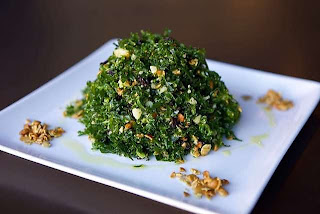“NAH, I DON'T shop at Aldi. Yes, chips and
stuff are inexpensive there but I don't support huge corporations
that sell us junk. They are evil! I go to Trader Joe's or Whole
Foods. Sometimes Greenlife.” Good. My ramens budget is kinda
limited too so I go to stores that sell them really low like 15 packs
for 50 cents, with a $2 Slantshack Jerky coupon. Yeah. It's all
economics to me. Health-wise, I let my weird logic take over.
Inhalation of carbon dioxide and methane emissions a.k.a. carbon
footprints a.k.a. greenhouse gas a.k.a. pollution—plus a dose too
much of political campaign speeches—will kill me faster than two
Cup-a-Noodles a week. But seriously, if we really want to improve or
change consumer behavior with a goal of minimizing “poison” in
our food, let's try to shake the source and support local growers and
producers. That's a good start.
But
let me ramble first... Aldi and Trader Joe's, you see, are owned by
the Albrecht brothers Karl and Theo of Germany. There are 10,000
Aldis in 18 countries and 457 Trader Joe's stores in the US, heaviest
concentration in Southern California. Founded by a cool dude named
Joe Coulombe in Monrovia CA, Trader Joe's—a market leader in
organic and fresh food groceries in the US—has long been bought or
acquired by Theo Albrecht. Damn goofy Theo, right? Meantime, Whole
Foods Market Inc., a supermarket chain specializing in organic food,
is a Fortune 500 company—the 30th largest retailer in the US. Some
of its One Percenter investors are Vanguard Total Stock Mkt. Index
and Harbor Capital Appreciation Instl. Think GMO, think Monsanto.
Whole Foods is also the owner of Greenlife Grocery (located in my
home city of Asheville).
The
boom in organic food has boosted sales over $32 billion annually and
has led some of the nation’s biggest food companies—General
Mills, Coca-Cola, Perdue, Kellogg—to acquire or take stakes in
smaller organic outfits. To name a few: Hormel’s acquisition of
Applegate Farms for $775 million; WhiteWave’s acquisition of So
Delicious/Turtle Mountain for $195 million and Wallaby Yogurt for
$125 million; General Mills’ acquisition of Annie’s Homegrown for
$820 million; Pinnacle Foods’ acquisition of Boulder Brands (Earth
Balance, Evol, Udi’s) for $975 million; Post’s acquisition of a
number of cereal and egg brands (including MOM/Malt-O-Meal/Better
Oats) for $1.15 billion; and JAB Holding’s acquisition of a number
of coffee brands (Green Mountain Einstein Bros./Noah’s, Stumptown
and Intelligentsia, Peet’s, and Caribou).
That's
just the way of the world, I guess. Remember those two kids who
invented a Batman-laser instant-flash whatever you called it beamed
on building walls to supposedly announce a “secret” Occupy
convergence? Those kids are now under the employ of giant techno
gods—collectively, these techno billionaires drop $5 billion a year
for R&D budget alone, more than the annual national budget of my
home country, the Philippines. Start-ups? Sell them to the big guys.
Dig? I don't have any problems with that—I mean, I ain't gonna lose
a good weekend's sex for that! Look, one day I will come up with 501
ramen recipes and maybe H.J. Heinz or Kraft Foods will be interested
to buy me out, right? Then I will steal the title “Ramen King”
from its inventor Momofuku Ando.
Thing
is, let's take it easy. We know who are damn selling us the good food
and the bad food. The same Wiley E. Coyote on Brooks Brothers suit!
Win win for the dude. Oh well, I wish organic produce and non-GMO
stuff are more affordable than the poison brands, just like when I
was a kid in an island-galaxy so far away. Open market produce and
other meats and fish etc are a lot inexpensive than manufactured shit
in groceries. Yet we weren't really paying much attention on
“healthy” or non-pesticide/no-antibiotics reminder—it was all
about economics. I mean, many times when I hear people say, I don't
go to Walmart or I don't support franchises, I can't help but wonder
out loud—are you saying we both hate the One Percent or you just
want your shit healthy or organic? If your answer is the former,
then—let's go to the tailgate market this weekend and buy some
homegrown cabbages and okra. Life is cool when it is simple. Feel me?







b.jpg)
b.jpg)



